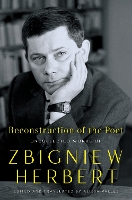


|
|
| book details |
Reconstruction of the Poet: Uncollected Works of Zbigniew Herbert
By (author) Zbigniew Herbert

|
This book is currently unavailable. Enquire to check if we can source a used copy
|
| book description |
From one of Poland's most acclaimed poets comes a new collection of poems and plays spanning almost five decades and translated for the first time. Encapsulating the prolific work of the poet and playwright Zbigniew Herbert, Reconstruction of the Poet is both a celebration of a profound life of letters and a wide-ranging collection of never-before-published work that casts new light on a much-loved poet. Spanning from 1950 to 1998, this volume of work contains three plays--The Philosophers' Cave, The Other Room, and Reconstruction of the Poet--and over fifty poems. This collection takes readers through the mind of a man attempting to look at the ruins of a postwar world while seeking living sources of European culture, with poems commemorating contemporaries fallen in wartime, elevating erotic experience and friendship, and exploring political and metaphysical passions. A rich expansion of previously published works by Herbert, Reconstruction of the Poet is both an introduction for readers who might still be unfamiliar with this important poet's work and a fresh invitation for reflection for his longtime readers.
| product details |
Normally shipped |
Publisher | HarperCollins Publishers Inc
Published date | 13 Aug 2024
Language |
Format | Hardback
Pages | 288
Dimensions | 237 x 156 x 24mm (L x W x H)
Weight | 404g
ISBN | 978-0-0628-8319-3
Readership Age |
BISAC | poetry / continental european
| other options |
|
|
|
To view the items in your trolley please sign in.
| sign in |
|
|
|
| specials |
|
|
Let's stare the future down and, instead of fearing AI, become solutionists.
|
This first comprehensive biography of Cecil Rhodes in a generation illuminates Rhodes’s vision for the expansion of imperialism in southern Africa, connecting politics and industry to internal development, and examines how this fueled a lasting, white-dominated colonial society.
|
|
|
|
|